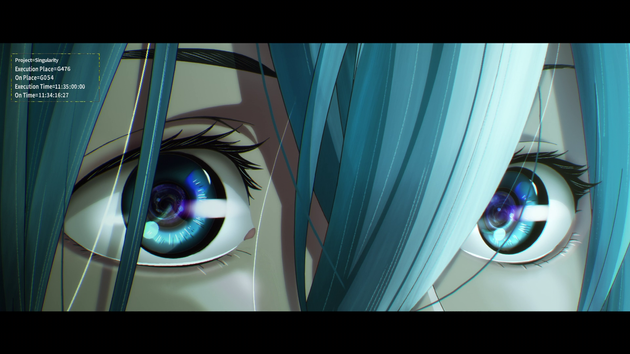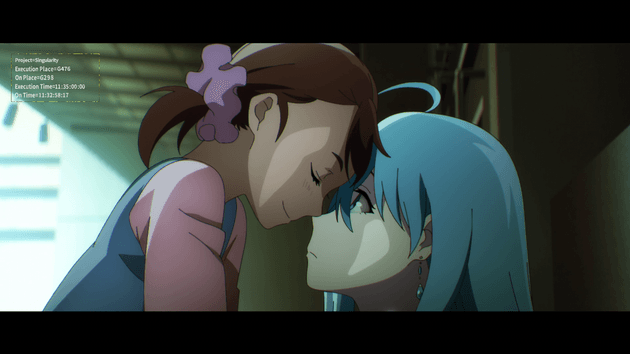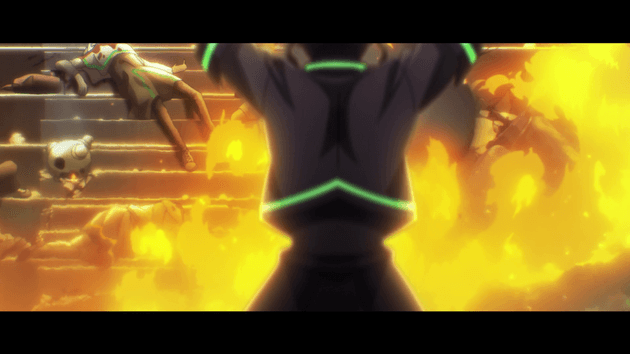Since I work with AI on a daily basis it always piques my interest when a work of fiction decides to focus upon it. For the most part, these types of series tend to go in the same direction: ‘artificial intelligence + technological singularity = bad’. I always hope to find one that will take a different route, and I’d very much like to believe we could have that in Vivy: Fluorite Eye’s Song.
Vivy follows the eponymous autonomous android (Tanezaki Atsumi)—ostensibly the first of her kind—whose singular purpose is to make humans happy with her singing. On a particular day, just prior to her performance, she’s invaded by another AI calling itself Matsumoto (Fukuyama Jun), who claims to have come from 100 years in the future to prevent a catastrophic war from breaking out between man and machine.

If this sounds familiar, that’s because it’s strikingly similar to many plots that have come before it and I struggled myself not to draw parallels with The Terminator1. With luck, it might diverge enough to shed those comparisons entirely, but I suspect it’ll be some time until we know for sure.
Personally, I love anime originals. We need more of them, but each year brings less. Vivy has the potential to be interesting in that its two central writers are Nagatsuki Tappei of Re:Zero fame, and Umehara Eiji, most known for ChäoS;Child, but who also contributed scripts to the anime adaptation of Re:Zero. While the potential is there, I don’t have quite the same faith in them as others appear to. Re:Zero is often great, but it has its flaws and some arcs drag. Tappei’s only other real work (Senyoku no Sigrdrifa) couldn’t keep my attention for more than a few episodes, and ChäoS;Child doesn’t remotely live up to its predecessors in the Science Adventure series.
But all that baggage is superfluous. There’s still a solid chance this will be an enjoyable series. WIT’s animation has proven a joy to watch and Kousaki Satoru brings us a soundtrack comprised of a blend of cinematic orchestra and refreshingly retro electronic sounds, free (so far) of the curse of modern developments in electronic music genres. I’ve always liked his Monogatari scores, so I have some faith that this one will continue to deliver.

Other than FukuJunfukujun and Hidaka Rina, I can’t say I care much about the seiyuu involved, though I’ve become so used to Koyasu Takehito (the human Matsumoto) voicing eccentric villains that I automatically assume anyone he voices is evil. Or a psychopath. Or both. I guess we’ll find out.
Out of the gate there are striking choices in direction, with many scenes concealing subtle nods to the first two episode’s themes or potentially foreshadowing what may be to come. Aikawa (Katou Masayuki) stands in the light, while Vivy remains in the darkness. The androids in the park seem to pass directives by touching forehead to forehead—a gesture mirrored in the interaction between Momoka (Tomita Miyu) and Vivy. Symbolism aside, were it not for the ending of the second episode, I’d question whether this might mean she was an AI too. After all, can it truly be a coincidence that she gave Vivy the bear that would later be possessed by an AI claiming to come from the future? I can’t imagine normal stuffed animals having the circuitry for that!

On the less subtle side, I really appreciated the way they visualised the singularity program preparing to execute, with the time ticking towards the eventual moment and the positions updating each time Vivy moved. It’s details like these that help to increase immersion and show just how much care was put into everything we’re shown.
When it comes to the plot…to be honest, I’ve never really liked it when time travel is used this way in fiction. It feels cheap and tired. An easy way to raise the stakes from the start while sapping away at the congruity of the plot. In truth I would prefer to hope it wasn’t time travel at all. There’s nothing to say Matsumoto isn’t lying about his origins, though the contrast in the cityscape between the now and then strongly implies a great deal of advancement, and promotional material2 is quite firm on the concept of this one-hundred-year journey. That doesn’t rule out that this could be a bait and switch. I’d even accept some form of time loop—a history doomed to repeat itself after the fall of human civilisation. Loops are certainly Tappei’s domain.
But what’s most important to me is how the series ultimately approaches the singularity. The concept of a technological singularity is almost always explored in the exact same way throughout the many forms of robotic fiction. This is in part why the double episode immediately had me thinking of The Terminator3. I sincerely hope Vivy chooses to use it in a different manner—they certainly have the opportunity. The episodes stressed the importance of the ‘one single mission’, and to some degree we still see AI following these in the future scenes, albeit in a warped and rather twisted manner.

Achieving an intelligence explosion need not be a bad thing, but could instead reflect the intention of becoming closer to human. It could mean moving away from that single-mission designation towards living as an autonomous being. In a sense, this would fulfil Matsumoto’s definition of ‘cruel’—to think and feel is cruel in the same way that a sentient existence inherently leads to suffering. She would be the first AI to bear the burden of feeling true emotion. In this vein, the concept of one-mission AI would prove to be the incorrect choice. They are essentially flawed mechanical slaves who fail at any other purpose. It’s remarkably easy to see how that might not end well, especially considering the control Matsumoto exerts over other simple robots while apparently unable to do the same to Vivy herself.
Of course, all of this is entirely conjecture and Occam’s razor applies more often than not. I’d love to imagine this series will approach AI differently to many of those that have come before, but it’s far too early to hold my breath.
Let’s just say I’m hooked for now and hope that Vivy can stick the landing!
-
Incidentally, one of my favourite FukuJun roles was also a pretty weird AI.
↩ -
But with idols!
↩ -
And episode titles!
↩ -
But with cute idol robots instead!
↩

